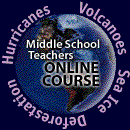![]()
![]()
![]()
Virtual
Study Spaces
The various spaces listed
below are where you will study and work individually and with the other
participants and your facilitator. You will need to link to these actual
spaces through the virtual online Classroom.
An overview of what you will do in each virtual study space is included
below.
Sphere
Space
You will work in Sphere Space during Weeks 4, 7, 10, and 13. You will
come together with the other members of your Sphere Group to study how
the effects of an event reverberate throughout the earth's four spheres:
hydrosphere, biosphere, lithosphere, and atmosphere. However, to better
understand the complexity of these reverberations, you will need to take
an in depth look at each sphere. Therefore, you and your Sphere Group
will focus on one sphere at a time and consider how it might be impacted
by one major event.
Event Space
You will work in Event Space during Weeks 5, 8, 11, and 14, following
Sphere Study. You and your Event Team will analyze how events (deforestation,
volcanoes, sea ice melting, hurricanes) directly affect specific spheres,
how the affected spheres may trigger changes in the other spheres, and
how any of the changes may impact the event itself. For each event, you
and your Event Team will write causal chains that synthesize your team's
analyses of the event and its impact on the spheres.
Classroom
Application Space
You will work in Classroom Application Space in Weeks 6, 9, 12, and 15,
following Event Study. You will work independently to design or locate
a classroom application for your students. While designing or locating
a classroom application, you should reflect on the analyses conducted
with your Sphere Group and Event Team and think about how you can transfer
what you have learned into teaching practice.
Journal
Space
You will reflect in your journal every week. The purpose of the online
journal is for you to keep a personal account of your progress throughout
the course. You are to record your thoughts, beliefs, concerns, successes,
and even your aborted successes--experiences from which you have learned
but may want to avoid in the future. Of special significance will be those
entries that reflect modifications to your beliefs about teaching and
learning. Keep in mind that your journal entries are not only a factor
in your final grade, but they are also meant to help you grow as a professional.
The only persons with access to your entries will be you and the facilitator.
You will also submit your Final Project in Journal Space. The purpose of completing the individual Final Project is for you to demonstrate that you have gained an appreciation and understanding of Earth system science and to show how your ESS knowledge has expanded as a result of taking this course.
Local Event
Space
You can complete an optional Local Event System Analysis at the end of
each three-week cycle (Weeks 6, 9, 12, and 15). For this analysis, you
can find a local event and discuss how that local event affects the four
spheres. An example might be the creation of a dam on a local river or
the development of a shopping center in your community. You are applying
the Earth system science concepts to your local events.
Course
Space
The facilitator uses Course Space to give instructions, clarify concepts,
and answer questions; participants use Course Space to request guidance,
reply to the facilitator’s queries, and--in Week 1--submit their
biographies and meet the other course participants.
Resource
Space
Throughout the course, the developers, facilitator, and participants may
submit those resources thought to be particularly useful both to participating
teachers' professional development and their students' use in the classroom.
These resources may be designed by you, or they may simply be compelling
activities you have found (e.g., on the Internet, on one of the course's
CDs, or other sources). They may include compelling and/or favorite web
sites or activities you have found or used.
Please remember that some materials are copyrighted. Be sure to include a full citation. If they are commercial, the source must be cited.
![]()
Where
to Start ...Joining
the Community ...
Knowing Your Facilitator ...How
to Sit in the Front ...
Virtual Cooperative Learning ...Being
an Online Learner ...
Learning
in an Online Environment ...Virtual
Study Space
Home ...Intro ...Outline ...Classroom
...
![]()

Maintained by ESSC Team
Last Updated July 26, 2000
Privacy Statement and Copyright© 1997-2000 by Wheeling Jesuit University/NASA Classroom of the Future™. All rights reserved.
